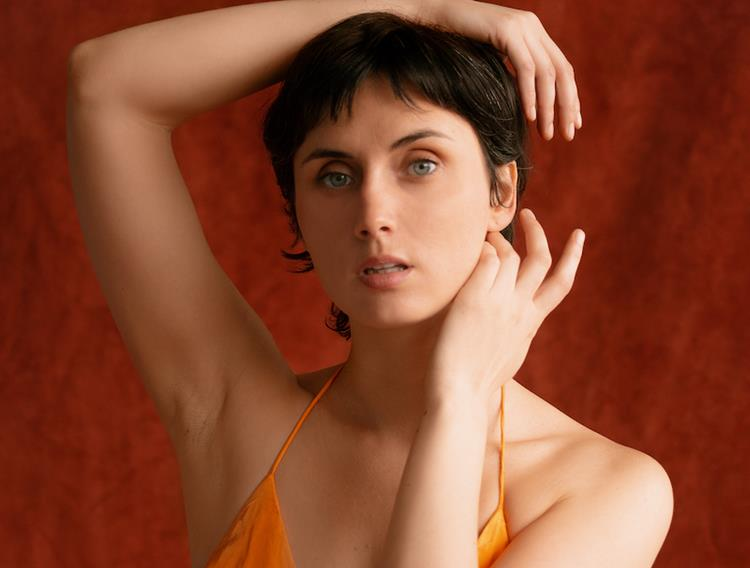Of all of our adept indie-folk storytellers, American singer-songwriter Katy Kirby knows how to read people best. Whereas Andy Shauf instinctively understands social settings and Adrianne Lenker tries to condense the cosmic, Kirby thinks about small gestures. She’s capturing the things that remain unaccounted for in relationships –– the moments that barely get noticed. In her debut album, “Cool Dry Place,” which released in 2021, Kirby described the arms and foreheads of her characters, secret languages between lovers and the emotional stoicism of firefighters.
Kirby’s sophomore album, “Blue Raspberry,” which was released last month, changes this a little. It’s a singular portrait of a recalling of Kirby’s experience falling in love with a woman for the first time. Her songcraft absorbs all of the back-and-forth uncertainty, moments of disappointment and glistening thrills love entails. Partnering again with producers Alberto Sewald and Logan Chung, who co-produced her debut, Kirby broadens her sound and focuses her songwriting.
“I felt like I should honor the spirit of these songs, and let them be big, beautiful love songs,” Kirby said in a recent interview with UPROXX.
It’s a reasonable mission statement for “Blue Raspberry” — everything here is grander and more surprising. The plucked acoustic guitars, bouncing percussion and keen steel guitar parts of “Cool Dry Place” are certainly present, but they’re bolstered by a new ambition in Kirby’s songwriting, as well as the wider reach of these instrumentals.
Kirby subverts listeners’ expectations almost immediately. “Redemption Arc” starts the album as a crystalline piano-ballad opener, a shock after Kirby’s guitar-centric past. Her past melodies have often been subtle, reappearing in your brain when least expected. “Redemption Arc” scraps that, doubling the vocals and the piano melody to emphasize the song’s narrative of reconciliation. “I take back my hallucinations / You couldn’t have known / That doesn’t make you innocent,” Kirby sings, reflecting how it feels to get knocked down by someone you love and slowly pick yourself back up.
Throughout “Blue Raspberry,” Kirby comes back to the idea of cubic zirconia, a lab-grown diamond, to represent the artificial choices we make in presenting ourselves. “Cubic Zirconia” is the namesake for the album’s lead single — a thoughtful song regarding bickering about insincerity. “Don’t you hate me when you see me turn it on?” she asks, wondering why being crowd-pleasing or charming isn’t impressive to her partner. These ideas appear again in “Salt Crystal” and “Alexandria” — songs that ask if there’s anything wrong with a little bit of artifice.
In “Alexandria,” Kirby lets the song slowly unfurl, soaking up the brushed drums and cello-induced tension until it opens into her biggest song yet. With its swooning atmosphere and distorted guitars, “Alexandria” would be perfect for a wistful montage in a romantic drama, a quintessential example of her “big, beautiful love songs.” But it’s also one of the songs on “Blue Raspberry” that hints at jealousy or uncertainty, especially with the closing line: “Don’t let me touch you if I can love you / Any less than she can.”
Plenty of the songs on “Blue Raspberry” have been in development for years, as demonstrated by the appearances of “Fences,” “Wait Listen,” and “Table” in Kirby’s setlists. Each of these road-worn songs have the atmosphere most similar to “Cool Dry Place” in tone. The explosive, temperamental rocker “Table” closes the record with a burst of fuzz and excitement. She chronicles an affair in “Wait Listen,” envisioning herself as feeling “crushed up like a Coke can,” with lightly strummed acoustic guitars and twinkling pianos in tow.
It’s in the title track that Kirby opens up the most. “Blue Raspberry” was the first song she wrote for the album, attempting to write a love song that captures feeling hopelessly romantic. With electric pianos and nylon guitars underneath, Kirby finds the right words for this feeling, describing being lovestruck as “the happiest kind of sorry for myself.” Her attention to detail works magically here as she notices how her inamorata fiddles with a straw, stabbing a cherry in her drink. Many songwriters would drop that line, but Kirby knows that it tells us the most important thing about “Blue Raspberry” — how consuming it can feel to be enchanted by someone else.
Contact Ethan Beck at [email protected].























































































































































